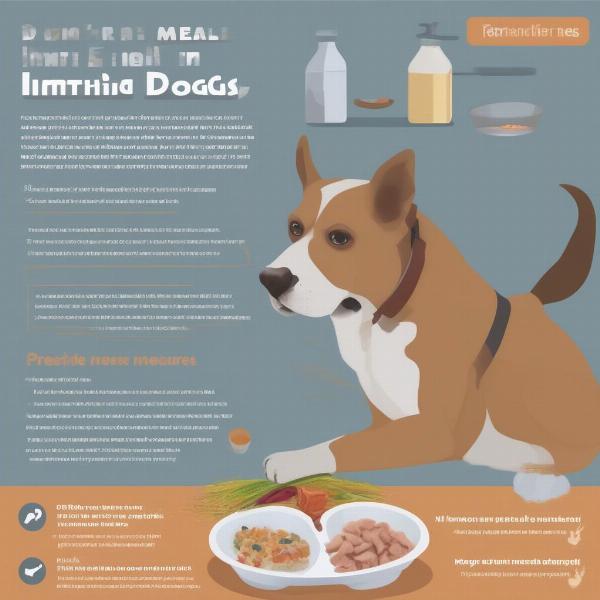Hot dog blow up. While this phrase might conjure images of comical inflatable toys, it can also refer to a serious and potentially life-threatening condition in dogs known as bloat, or more accurately, Gastric Dilatation-Volvulus (GDV). Understanding the causes, symptoms, and preventative measures associated with GDV is crucial for every dog owner.
What is GDV (Gastric Dilatation-Volvulus)?
GDV occurs when a dog’s stomach fills with gas and/or fluid, causing it to expand (dilatation). In some cases, the stomach can then twist (volvulus), cutting off blood supply to the stomach and spleen, and preventing the dog from expelling the gas or fluid. This is a medical emergency requiring immediate veterinary attention.
Recognizing the Signs: Is Your Dog at Risk?
While any dog can experience bloat, certain breeds, especially large, deep-chested dogs like Great Danes, German Shepherds, and Standard Poodles are predisposed. Knowing the symptoms is crucial:
- Restlessness and pacing
- Unproductive retching or attempts to vomit
- Distended abdomen (looks bloated)
- Excessive drooling
- Weakness and collapse
If you observe any of these signs, seek veterinary care immediately. Time is of the essence with GDV.
Preventing GDV: Proactive Steps for Your Dog’s Health
While there are no guarantees, several preventative measures can significantly reduce the risk of GDV:
- Feed smaller, more frequent meals instead of one large meal.
- Avoid elevated food bowls. Studies have shown a correlation between elevated bowls and GDV, particularly in at-risk breeds.
- dog grooming modesto ca Regular grooming is essential for overall dog health.
- Limit strenuous exercise immediately after eating.
- Ensure access to fresh water at all times.
- Consider preventative gastropexy surgery, especially for high-risk breeds. This procedure involves tacking the stomach to the abdominal wall to prevent rotation.
Dr. Emily Carter, DVM, a leading veterinary surgeon specializing in canine gastrointestinal health, advises, “Early intervention is key with GDV. Knowing the signs and seeking immediate veterinary care can be life-saving.”
 Preventative Measures for GDV
Preventative Measures for GDV
Living with a Dog Prone to Bloat: Ongoing Care
If you have a breed predisposed to bloat, maintaining open communication with your veterinarian is crucial. Regular check-ups and discussing any concerns can help ensure your dog’s long-term health and well-being. oktoberfest dog costume While fun costumes are enjoyable, prioritize your dog’s comfort and safety. Avoid costumes that restrict movement or breathing, especially if your dog is prone to bloat.
Dr. Michael Davies, a board-certified veterinary internist, emphasizes, “Proactive management is vital for dogs susceptible to bloat. Discuss preventative measures with your vet and establish a plan for ongoing care.” found one flea on dog but no more Addressing parasite concerns proactively is part of a comprehensive health plan.
Conclusion
While the phrase “hot dog blow up” might seem innocuous, understanding the seriousness of GDV is essential for every dog owner. By recognizing the signs, implementing preventative measures, and maintaining regular communication with your veterinarian, you can help protect your canine companion from this life-threatening condition. pogo hot dog Prioritizing your dog’s health is paramount. dog grooming cambridge Regular grooming contributes to a healthy and happy dog.
FAQ
-
What is the most common cause of bloat in dogs? While the exact cause is unknown, rapid ingestion of large amounts of food and water, followed by strenuous exercise, is a significant contributing factor.
-
Can bloat be treated? Yes, but immediate veterinary intervention is crucial. Treatment typically involves stabilizing the dog, decompressing the stomach, and potentially performing surgery to prevent recurrence.
-
Are certain breeds more prone to bloat? Yes, large, deep-chested breeds are at higher risk.
-
What is gastropexy surgery? It’s a preventative procedure where the stomach is surgically attached to the abdominal wall, preventing it from twisting.
-
How can I reduce my dog’s risk of bloat? Feed smaller, more frequent meals, avoid elevated food bowls, and limit strenuous exercise after eating.
-
What should I do if I suspect my dog has bloat? Seek immediate veterinary care.
-
Is bloat always fatal? No, but it is a serious condition with a high mortality rate if not treated promptly.
ILM Dog is a leading international online resource dedicated to providing expert advice and information on all aspects of dog care and well-being. From breed selection to health and nutrition, training and behavior, we offer a wealth of knowledge to help you provide the best possible care for your furry friend. We cover everything from puppy care to senior dog care, travel tips, and product recommendations. We are committed to empowering dog owners worldwide with the tools and information they need to nurture a happy, healthy, and fulfilling relationship with their canine companions. Contact us for personalized advice and support: Email: [email protected], Phone: +44 20-3965-8624. ILM Dog is here to guide you on your dog ownership journey.